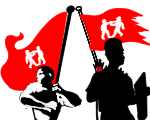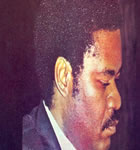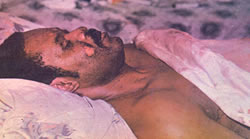|
||||||||||||||
|
||||||||||||||
independent media hand who compulsively upholds conscientious journalism? Then, you are an exponent of brobdingnagian journalism. We marks the murder of Dele Giwa, a powerhouse of this brand of journalism. Weekend Observer today in a remembrance mood takes a look at this journalism type rare to findas chameleon faeces.
First, the man Dele Giwa:
On several occasions Dele Giwa carried similar stories in his magazine about the country. Alas, Hurricane Giwa had been let loose on Nigeria. It was alleged that, to stifle Dele Giwa’s brobdingnagian journalism, Babangida offered him the post of Minister For Information. But no dice. Dele Giwa refused the appeasement. Later, the post went to Tony Momoh. Hopefully as an Etsako Kinsman and a journalism colleague of Dele Giwa, Babangida expected Dele Giwa’s “editorial exuberance” would be restrained. However, still, no one could domesticate him. He was too hot to handle. Infact, his editorial sights were daily set on doing more earth moving stories, one of which was on Gloria Okon. She was the woman allegedly arrested with hard drugs at an airport. They were being taken abroad for sale on behalf of a top military officer and his wife. To avoid exposure, the officer “arranged” her false death. Thereafter, she was flown abroad into safety. Source reveal that Dele Giwa got this news and offered to investigate it during his magazine’s editorial conference. Unknown to him, its offices had been bugged. The decision to do a story on Gloria Okon, therefore, leaked. Things moved fast. Before the story could appear on the pages of his magazine, he was blown to pieces with a letter bomb. And so the man died on October 19, 1986. Before Dele Giwa arrived Nigeria Enter Peter Enahoro. For instance, as a journalist in the sixties working for Daily Times, the Ishan-born pen pusher wrote a biting column in the newspaper which irritated the nerves of the establishment. When Gowon assumed office as military head of state on July 29, 1996, he found the column unbearable. All subtle military pressure to coerce Peter Enahoro to scale his write-ups down to comfort, pro-government journalism failed. He was then earmarked for arrest and detention by Gowon. The evil plot got to Peter Enahoro’s ears. This led to his flight to self asylum in Germany for over 25 years. A strain of Dele Giwa’s Brobdingnagian journalism involves standing up for courageous professionalism in media practice. An example. In the 80s, Ray Ekpu ran into troubled editorial waters with his incisive column in Sunday Times. As punishment for this, he was reassigned from his desk as Sunday Times editorial to the “dirty” job of editor, Business Times. Expectedly, as Business Times editor, he wouldn’t be able to craft his irritating no-holds-barred column and reports. To add acid to his injury, his new office was situated near a toilet from where urine and faeces assailed his nostrils.
Indeed, Dele Giwa’s style of principled journalism, therefore, celebrates media independence at in-house and outhouse levels. The late Babatunde Jose, a veteran journalist and father of modern Nigerian Journalism epitomized what Dele Giwa stood for. In December 1957, Babatunde Jose was made the first Nigerian editor of the behemoth Daily Times. A very rare privilege. A sort of “bribe” by the British colonialist as a reward for his hard, knowledgeable media entrepreneurship. However, Babatunde Jose like Dele Giwa was a man who could never be bought over by office. So during his acceptance speech as editor he told Cecil King his boss and managing director of Daily Times: “sir, I do not like to be king while someone else is the ruler which is the present position in the Daily Times where a European adviser oversees the work of the Nigerian editor – giving the impression that the Nigerian editor is a mere figure.”
On his part Chief Segun Osoba, former governor of Ogun State, was an exponent of Brobdingnagian journalism as a reporter. As one at Daily Times in the seventies, then a flagship of Nigerian journalism, he was a hard broiled investigative media person. Not the sitting-duck type with an appetite for sleeping in the newsroom waiting for news. Characteristically, he was a proverbial news hunter. This explained why he scampered out into the street on his vespa motorcycle, almost half-naked on July 29, 1975 when the military coup against Gowon was announced. He didn’t require his editor’s promptings to do this. The lure of Brobdingnagian journalism compelled him to risk his life searching for scoops on an unsafe coup day. Other exponents of Brobdingnagian journalism Unwittingly, therefore the journalists fell foul of the obnoxious Decree 4 of the administration which sought to protect public officers from embarrassing publications whether they are true or not. A deal was allegedly brokered by the administration to soft pedal on the journalists’ “offence” if only they identified the mole who regularly leaked government secrets to them. The journalists refused to play ball with the administration, realizing that doing so would breach the sacred confidential canon of media practice. Angry, the administration jailed them out of malice. It is not only these fearless journalists that have been incarcerated in Nigeria. Several others have suffered a similar fate. Ben Charles Obi, editor of Weekend Classique was for instance sent to jail by Abacha for “waging a war against his military junta”. May Ellen Ezekiel, his boss and a student of Dele Giwa’s Brobdingnagian journalism tried to save Ben Charles Obi. She offered herself to be sacrificed in his place. But her plea didn’t cut ice. Obi was imprisoned after a phantom, secret trial by a military tribunal. May Ellen Ezekiel offered succour to him while he was in prison but unfortunately she died before he was released in 1998. Kunle Ajibade is one of the most self-effacing media persons in Nigeria. He was equally incarcerated by the Abacha military junta as a price for his magazine’s vibrant guerilla journalism that unsettled Abacha. Like Ben Charles Obi, he was set free in 1998 from a life sentence imposed on him by the Abacha junta. Abacha’s death saved both Charles Obi and Kunle Ajibade. Today, The News as a magazine has not relented in its tradition of upholding courageous, dare-devil journalism. On July 14 and 21, 2008 it went to town with an earthmoving story of a MTN phone conversation between Justice Thomas Naron and Oyinlola’s counsel Otunba Kalejaiye while a petition challenging the governor’s election in 2007 was being heard. It is a great digital breakthrough for he magazine in investigative journalism which showed that a press scoop is still possible without a Freedom of Information Act. Situation report in Edo State
In Edo State, today, Brobdingnagian journalism is in the works. Its consistent exponents are Efe Osafoumwan, moderator of MAN AROUND TOWN in the Independent Radio, Benin; Madam ALL Weather of the same radio station; and famous Lady Alpha, now of the EBS programme You Talk I Talk. It is a breath of fresh air that, although they live and work in a violent state, they fearlessly undertake their biting brand of journalism, ignoring the Anini stares of blood-thirty, greedy political godfather.
Yes, Dele Giwa Lives On For Dele Giwa anyway, death had no sting, no victory. This is because his perfected brand of Brobdingnagian journalism still lives in the hearts and minds of Nigerian media workers today. These workers have one advice for those who cannot stand the hellish heat of their reportage, columns and broadcast programmes. His advice? LEAVE THE KITCHEN. Turn a new leaf. Uphold good governance, transparency and public accountability. |
||||||||||||||
|
| ||||||||||||||








